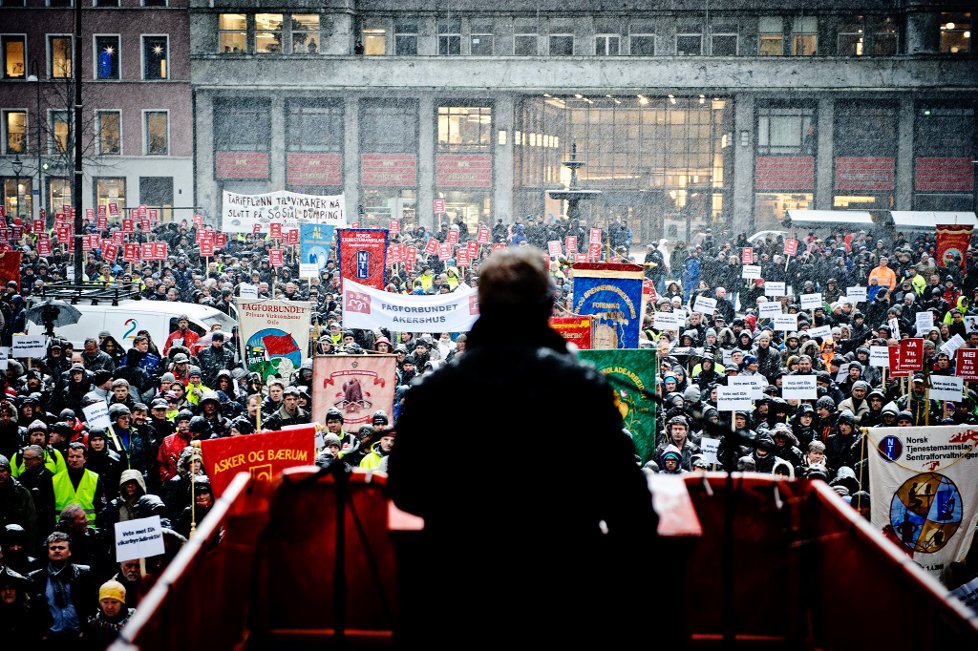Democrat January-February 2012 (Number 127)
Social Europe is Anti-Social Europe

Following a general strike in Norway in January, the country's TUC (LO) has voted unanimously against government plans to implement the EU Temporary and Agency Workers Directive into Norwegian law. Norwegian trade unionists understand that the EU Temporary and Agency Workers Directive is not about defending vulnerable workers but introducing widespread social dumping and deregulating the labour market in order to increase corporate profits at the expense of workers. It is clear that the implementation of the directive will undermine Norwegian labour laws and introduce the large scale use of temporary and agency workers, forcing out permanent workers, weaken workers' rights and collective agreements.
The fact that nationwide strike action is taking place in Norway against a directive that allegedly makes up as large part of the so-called 'Social Europe' agenda tells us a lot about what this agenda actually delivers.
The directive gives final authority over Norwegian employment legislation to the Court of Justice of the European Free Trade Association States (EFTA Court), a supranational judicial body responsible for the three EFTA/EEA members Iceland, Liechtenstein and Norway.
This court is very similar to the EU's European Court of Justice (ECJ) which has already made some draconian judgments striking down trade union collective bargaining rights in nearby Sweden and Finland in the Laval and Viking cases. The EU court ruled that under the EU treaties business rights to 'establishment' overrule basic trade union rights, rulings that have not gone unnoticed in Norway.
Backing the action, International Transport Workers' Federation general secretary David Cockroft said that Norway's legislation on contract labour and temporary employment was some of the best there is. "The directive doesn't just risk taking a good law and making it mediocre, it could also strip the rights currently enjoyed by workers and open the floodgates to their replacement by precariously employed temporary and agency staff - who will themselves get inferior employment protection," he said.
Norway has a low level of unemployment compared to many other European countries and much less use of temporary labour. The growth of Temporary and Agency Workers (TAW) is uneven across Europe but is inextricably linked to how deregulated the economy is in line with neoliberal EU rules.
According to figures released in 2007 the number of temporary agency workers in Germany was just 8,172; in the UK it was nearly 1.2 million. That number has probably expanded in the intervening years across the EU and pressure is being applied to ensure the number of TAW grows in Norway.
A recent opinion poll suggested that 76 per cent of Norwegians want their country to remain outside the EU.
Yet a recent government-commissioned report carried out by Professor Fredrik Sejersted of the University of Oslo found that Norway has embraced 75 per cent of the EU's regulations over the years and more than 6,000 EU laws have been included in Norwegian law. "We are almost as deeply integrated as the UK," he says. The report - Outside and Inside - calls this a "great democratic deficit" suggesting that as Norway's integration with the EU intensified, media, public and political understanding has shrunk massively.
"There are few areas of Norwegian democracy today where so many know so little about so much as is the case with Norwegian European policy," he says.
This strike reveals the deep rift between the democratic demands of Norway's people and the Norwegian political class and its collusion with the EU to implement a neoliberal economic and social agenda without a mandate.
As the crisis intensifies across Europe, former EU president Jacques Delors' infamous 'Social Europe' agenda is being exposed as the Trojan horse for the Anti-Social Europe that it is.
__________
Report by Brian Denny
Also see the full text of the pamphlet "Social Europe is a Con" which has sections dealing with ECJ rulings and Mode 4 - 'free movement of labour'. This is available here in pdf format.